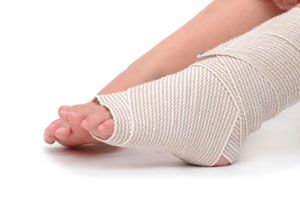Ankle pain is a painful and unpleasant experience that can keep you awake the entire night. The causes of it may vary from a small fracture to arthritis. Buzzle tells you more...
 Enlarge Image
Enlarge Image
Did You Know?
The ankle is the most commonly broken bone in the human body.
The ankle is a weight-bearing joint connecting the foot with the leg, bounded by strong ligaments, tendons, and muscles. It helps our foot to move in two prime directions: away from the body (plantar flexion) and towards the body (dorsiflexion). Sharp pain or ankle swelling at night can be due to an ankle sprain or a twist in the ankle as a result of an injury or a small tear in the ligaments connecting the bones to one another. The most common symptoms are swelling, bruising or deformity around the joint which may occur due to rupture or damage of tendons (which join muscles to bone), cartilage (which cushions joints), and blood vessels in the ankle. Quite often, the pain may also extend up to the adjacent areas like the foot, lower leg, knee, and even hip.
Causes of Ankle Pain at Night
- Plantar Fasciitis/Heel Spur: It's a painful non-inflammatory degenerative condition of the foot caused by excessive stretching of the plantar fasciitis muscle. The muscle extends along the sole of the foot towards the five toes, and if overworked or seated improperly in shoes, can cause intense pain in the ankle.
- Ligament Sprain: A sprain in the foot or ankle can occur due to a sudden sideways or twisting movement of the foot while exercising, walking, or even taking a misstep. It is an injury to the ligaments of the ankle that causes severe pain and swelling.
- Stress Fracture: It's a type of incomplete fracture in the bones due to an over accumulation of unusual or repeated stress on the bones of the foot.
- Gout: Considered to be the 'rich man's disease', it usually occurs in people having a diet rich in alcohol and fatty foods. It is a painful inflammation of feet due to excessive amount of uric acid in the body, which gets deposited in the form of crystals or salts in the joints and blood, instead of being excreted in the urine.
- Poor Circulation: Feet and hands are considered to be the most poor circulation areas in our body, as the blood always has trouble circulating in these extremities of our body. Diet, age, genetics, or medical conditions such as diabetes, can be some possible reasons for poor circulation which may result in pain and discomfort in the feet, especially if the feet are resting in one position for a long time.
- Arthritis: It causes of ankle pain at night due to degenerative changes in the joints. It mainly occurs due to aging, injury, infection, mineral deficiency, or some hereditary factors. In this, the cartilage covering the joints wears away, causing pain, swelling, and inflammation of the joints.
- Tendonitis: It is an inflammation or irritation of a tendon, which is a thick cord that connects muscles to the bone. It is usually occurs due to repetitive, minor impact on the affected area, causing severe ankle pain.
- Nerve Entrapment: It is a condition similar to the carpal tunnel syndrome of the hand/wrist. It is also known as a tarsal tunnel syndrome, and occurs due to repeated pressure on the tibial nerve. The pressure causes the nerve to get irritated, swollen, and eventually the nerve is compressed. This leads to a decrease in the blood-flow to the nerve, and sensations of numbness and tingling are experienced along with pain in the ankle, toes, arch, and the heel.
- Growing Pains: If none of the above conditions are the cause of the pain, and if the individual is a pubescent in his/her developmental and growth stage, then the ankle pain can be attributed as being growing pains. It is characterized by persistent pain, swelling, fever, fatigue, etc. It is caused due to the growth and development of bones at a fast rate.
Treatment Options
- Elevate Your Feet: While sleeping, try elevating your feet to a comfortable level for a few nights to minimize swelling in the feet and ankles.
- Change Shoes: Try wearing shoes that fit your feet properly and give enough support to your arch. Avoid wearing boots or high-heeled shoes, especially if you are experiencing any kind of pain or discomfort in your ankle.
- Medications: For immediate relief over-the-counter pain relief medications, anti-inflammatory drugs, analgesics, etc., can be used. In fact, you can also have an aspirin before sleeping every night to reduce swelling and ankle pain.
- Braces: If walking is unavoidable, start using crutches, splints, or braces to avoid putting weight on the affected ankle.
- Other Methods: Maintaining a healthy diet, walking barefoot, massaging or applying ice/heat packs on the affected ankle will also provide relief from pain and swelling.
The best way to treat ankle pain is to take proper rest until the pain, swelling, and inflammation subside. Performing light stretching exercises of the muscles, tendons, and ligaments under a doctor's supervision will help relieve the pain and reduce the risks of experiencing it again.
Disclaimer:
This Buzzle article is for informative purposes only, and should not be used as a replacement for expert medical advice.


 Enlarge Image
Enlarge Image